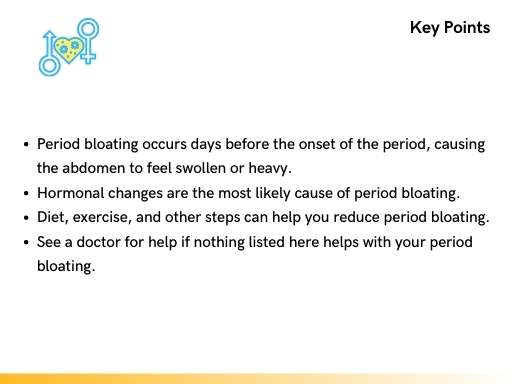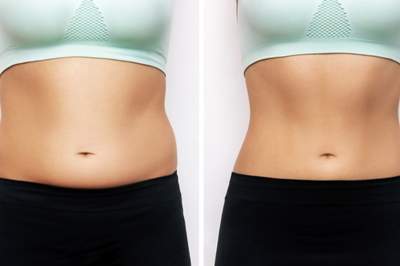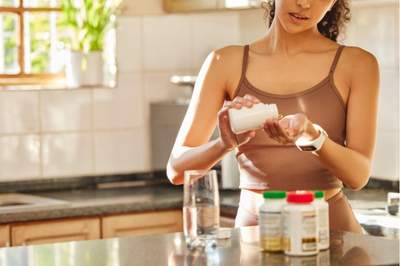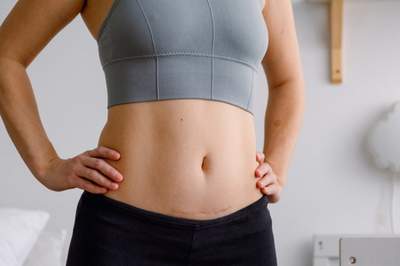 Period bloating or premenstrual water retention is a significant problem for many women. Bloating affects many women during the one to two days before the onset of their periods. Some women may notice these changes up to five days before menstruating.
Period bloating or premenstrual water retention is a significant problem for many women. Bloating affects many women during the one to two days before the onset of their periods. Some women may notice these changes up to five days before menstruating.
Premenstrual syndrome (PMS) affects 80 to 90% of women in some way. Along with bloating, women may experience headaches, mood swings, tender breasts, food cravings, acne, fatigue, backache, cramping, diarrhea, or constipation. Every woman experiences PMS differently, and symptoms can change at any point. Symptoms can be mild to severe, with those at the extreme end finding it difficult to carry on with their daily activities.
This article focuses on period bloating; why it happens, and ways to manage it.
What is Period Bloating?
 Period bloating occurs when the abdomen feels swollen, tight, or heavy days before the onset of your period. It is one of the most common signs of the start of menstruation. It is also highly distressing for many women as clothes may not fit. Although it is a typical sign of the approach of “that time of the month,” it can be uncomfortable. Some women experience constipation or diarrhea along with bloating.
Period bloating occurs when the abdomen feels swollen, tight, or heavy days before the onset of your period. It is one of the most common signs of the start of menstruation. It is also highly distressing for many women as clothes may not fit. Although it is a typical sign of the approach of “that time of the month,” it can be uncomfortable. Some women experience constipation or diarrhea along with bloating.
Period bloating can impact a woman’s self-confidence, especially if she has an event or occasion at that time and the outfit she planned to wear no longer fits. It can feel as though you have gained weight. The uncomfortable tightness will often disappear within a few days of starting your period.
Why do Women Experience Period Bloating?
The most likely cause of period bloating is the hormone level change that occurs during a woman’s monthly cycle. Following ovulation, estrogen and progesterone levels decline. These hormone levels rise after your period, which is why PMS symptoms disappear following menstruation.
Period bloating and other PMS symptoms might increase with age, especially for women in their thirties and older. Stress, a family history of depression, smoking, alcohol, caffeine, and a high salt diet can increase the risk of bloating.
How Long Does Period Bloating Last?
Most women should see relief from period bloating within two to four days after the start of menstruation.
How do Doctors Diagnose PMS?
There is no PMS test. Your doctor will ask you to keep track of your symptoms for a few months. If the onset of symptoms occurs within five days before your monthly period and ends within four days after it starts, you likely have PMS. Severe or extreme PMS is when these symptoms interfere with your daily life or activities.
Period bloating can exacerbate other health issues, including irritable bowel syndrome (IBS).
Best Ways to Manage Period Bloating
You can take steps to reduce period bloating. Lifestyle changes are the most important, including watching what you eat, exercising regularly, and getting adequate sleep.
Improve your diet
Reducing salt intake can help decrease period bloating. Salt increases water retention, something you do not want at this time. Many women crave salty foods before and during their periods. Choose to use herbs rather than salt in your cooking. Sugar is the other item women crave during this time, yet it can also increase PMS symptoms. Try to avoid sugar and salt consumption during the two weeks leading up to your period.
Another factor in eating is slowing down and chewing your food well. If you eat fast, you might swallow air. That can increase bloating. Avoid chewing gum and consuming carbonated drinks, as well. Make sure to drink plenty of water to reduce constipation and improve water retention. Increase consumption of high-fiber foods, lean protein, and complex carbohydrates.
Exercise regularly
Aerobic exercise and yoga may help reduce bloating and other PMS symptoms. Exercise provides additional benefits that can aid in combatting depression, fatigue, and difficulty concentrating by releasing beneficial endorphins into the bloodstream that help reduce stress.
Avoid coffee, alcohol, and smoking
Caffeine, alcohol, and smoking can increase PMS symptoms. Avoiding these habits can help reduce your symptoms.
Get plenty of sleep
Sleep deprivation (less than 6 hours) can increase stress and anxiety. Getting an average of eight hours of sleep each night can help lessen your PMS symptoms.
Take medication if needed
Diuretics (water pills) can help reduce fluid retention. Do not take diuretics with NSAIDs (nonsteroidal anti-inflammatory drugs) such as ibuprofen or naproxen sodium, which can lead to kidney damage.
Anti-anxiety or antidepressant medications may help with the emotional aspects of PMS, although they will not do anything for period bloating.
Try supplements
 Before taking any supplements, always check with your doctor. Some studies have found benefits for various vitamins and supplements.
Before taking any supplements, always check with your doctor. Some studies have found benefits for various vitamins and supplements.
- Calcium might help reduce food cravings, depression, and fatigue.
- Magnesium might help decrease water retention.
- Polyunsaturated fatty acids such as omega-3 and omega-6 may help with cramps.
- Vitamin B6 may help reduce period bloating, anxiety, forgetfulness, and mood swings.
- Hormones
Birth control pills contain different hormones that can help regulate your period and reduce bloating and other PMS symptoms. It may take a few months to try several different birth control types to help. You will need to see a doctor for this.
Stress reduction is crucial. Consider meditation, massage, breathing exercises, and relaxation techniques.
When to See a Doctor for Period Bloating
A visit to your doctor can help when you cannot get relief from your period bloating or other PMS symptoms. We recommend tracking your symptoms in a diary for a few months, writing in detail when each sign began and how long it lasted. Your doctor will also want to know about the severity of each symptom and if it interfered with your life. The more information you can provide, the better able the doctor will be to help you.
You will also want to tell the doctor all the steps you have taken to try and improve your bloating and PMS symptoms. That way, the doctor will know what has and has not helped.
Conclusion
Period bloating is a temporary condition resulting from changes in hormone balance that women experience each month. The best treatment options for period bloating are regular exercise, watching what you eat, and getting enough sleep. Decreasing alcohol, salt, sugar, caffeine, and fat consumption and not smoking can also help reduce bloating.
Some medications, including diuretics and birth control pills (hormones), can help. See your doctor if taking steps like those mentioned here do not work.

